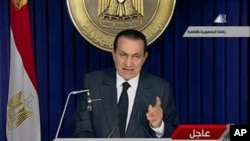Egyptian President Hosni Mubarak has delegated powers to his vice president but insists he will stay in office until a September election His announcement on state television late Thursday angered anti-government demonstrators who had hoped to hear the president announce his resignation.
President Hosni Mubarak's speech was followed by loud and disappointed roars from the thousands of protesters who had massed at Cairo's Tahrir Square on Thursday. Some waved shoes as a sign of anger and disrespect.
Their hopes had been raised when an army commander addressed them earlier in the day and said the 82-year-old president was going to meet their demands.
The demonstrators want Mubarak to resign immediately. Those words did not come Thursday night when the man who has led Egypt nearly 30 years addressed the nation on state television.
Mubarak said he is transferring some of his powers to his newly appointed vice president, and said he would work to carry out a peaceful transition of power.
He did not specify which powers he is handing over. Mubarak said he will not be subjected to foreign pressure for him to step down.
Elections are scheduled for September, and Mubarak said he would not seek re-election. That statement a few days ago did nothing to stop the protests which have been going on since January 25 and have sometimes triggered violence.
Mubarak's vice president went on television shortly after the leader's speech and urged demonstrators to go back to work.
There was no sign that the demonstrators are ready to comply. More large protests are expected Friday after Muslim prayers.
Slide show of events in Egypt
Timeline of Mubarak's career

